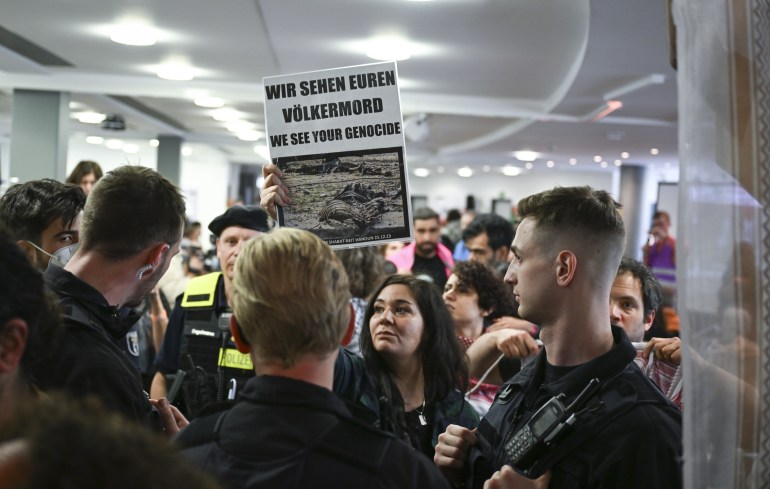Police in Berlin interrupted and cancelled a pro-Palestine conference soon after it started, hours after one of the main speakers said authorities held him up at the airport and prevented him from entering Germany.
Officers initially halted the Palestine Congress because another speaker was subject to a ban on political activity in Germany, police wrote on the social media platform X on Friday.
Police did not give the name of the speaker, but participants in the congress wrote on X that it was Palestinian researcher Salman Abu Sitta.
Police later wrote on X that they had banned the remainder of the conference, which was being attended by about 250 people and due to last until Sunday.
They said there were risks that same speaker would be invited to talk again, accusing him of having made “anti-Semitic” statements in the past.
Berlin police just canceled the entire Palestine Congress. I was the only speaker that successfully finished a speech.
Salman Abu Sitta was cut off after 1 minute. Our livestream ended and electricity cut off.
This is Germany. pic.twitter.com/07NUCpownv
— Hebh Jamal (@hebh_jamal) April 12, 2024
On the Congress’s website, the organisers denounce Israel’s crimes in Gaza, saying: “Together, with the voices of the Palestinian movement and the international community, we will denounce Israeli apartheid and genocide. We accuse Germany of being complicit.”
Berlin police said they had dispatched 930 officers, including reinforcements from other regions of Germany, to secure the event.
‘Silencing a witness’
One of the main speakers, Ghassan Abu Sittah, a British Palestinian doctor, had earlier been denied entry into Germany to attend the event, he said.
“The German government has forcibly prevented me from entering the country,” Abu Sittah posted on X.
The doctor, who volunteered in Gaza hospitals during the first weeks of Israel’s war, said he arrived at Berlin airport on Friday morning before being stopped at passport control, where he was held for several hours and then told he had to return to the UK.
Airport police said he was refused entry due to “the safety of the people at the conference and public order,” Abu Sittah told The Associated Press.
An event organiser, Nadija Samour, told Turkey’s state-run Anadolu Agency, “There is absolutely no legal basis for this, no justification at all. [Abu] Sittah is the dean of the University of Glasgow. I can’t imagine that he’s a dangerous person or a person who incites violence. Quite the opposite.”
Abu Sittah added on X that barring him from the event was “silencing a witness to genocide before the ICJ adds to Germany’s complicity in the ongoing massacre.”
Invited to address a conference in Berlin about my work in Gaza hospitals during the present conflict.
The German government has forcibly prevented me from entering the country
Silencing a witness to genocide before the ICJ adds to Germany’s complicity in the ongoing massacre.— Ghassan Abu Sitta (@GhassanAbuSitt1) April 12, 2024
In a case at the top UN court brought by Nicaragua, Germany is facing accusations of aiding genocide in Gaza by selling arms to Israel, whose war has killed more than 33,600 people since October 7.
Germany is one of Israel’s biggest military suppliers, sending 326.5 million euros ($353.7m) in equipment and weapons in 2023, according to Economy Ministry data.
‘Government pressure’
There was “pressure from the federal government” to cancel the Palestine Congress, organiser Samour told Anadolu, adding that Germany was “actively and illicitly” trying to impede the event.
She also accused Berlin of intentionally delaying the start of the congress, citing technical reasons as a pretext.
“The congress could not be banned. Freedom of assembly protects the congress, which is precisely why the police came up with all sorts of harassment,” she said.

The crowd waiting to enter the hall on Friday chanted slogans including “Viva, Viva Palestine” and “Germany finances, Israel bombs”. Some waved Palestinian flags outside the building.
Police in Berlin have taken a generally tough stance towards pro-Palestinian protests since the start of the war in Gaza. Authorities have put strict conditions on demonstrations or banned them outright.
Protesters and critics have accused authorities of violating democratic freedoms of speech and assembly with the crackdowns.

